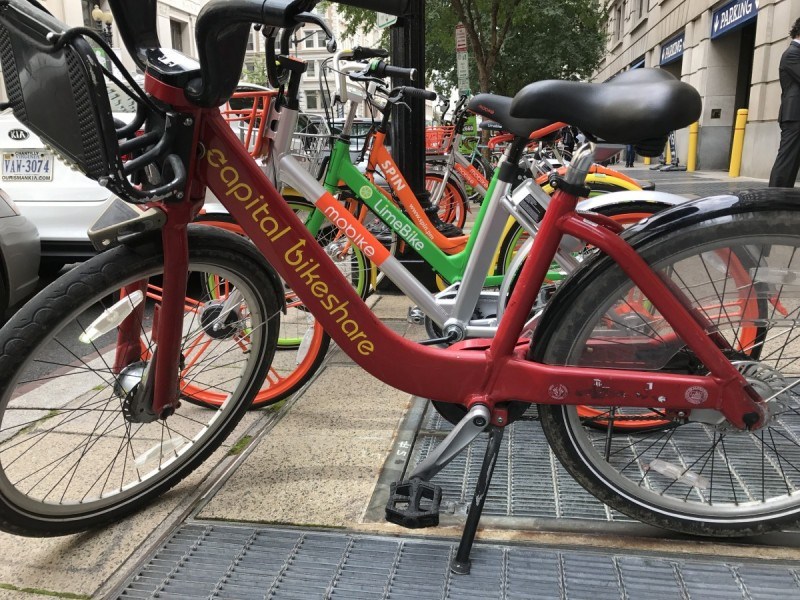Fleets of free-floating scooters, bikes, and e-bikes for-hire are popping up in dozens of American cities.
The expansion of nimble, mostly human-powered vehicles for point-to-point trips has a lot of promise. Most trips in cities are less than a few miles long. The new services also pose a few challenges, like how to prevent an influx of smaller vehicles from cluttering sidewalks.
This week, the National Association of City Transportation Officials released guidelines to help cities manage these services without getting taken for a ride. Here's a review of NACTO's recommendations.
1. Set up parking zones for the vehicles in the street.
To prevent the vehicles from getting in people's way on the sidewalk, provide space for them in the street. One official in DC, for example, has proposed adding bike corrals at the end of every block. It makes intersections safer, and it's only fair considering the enormous amount of curb space cities have devoted to free car storage.
2. Companies, not the public, should cover the cost of keeping their fleets in order.
To pay for staff and equipment to field complaints about errant vehicles and install new racks for the bikes and scooters, cities should charge fees that approximate these costs. One-time application fees and recurring fees per vehicle are both employed. The key principle NACTO recommends is to set the fees to roughly match the public costs incurred by the services.
3. Companies can be required to remove bikes or scooters that are blocking the right of way in a set period of time.
A variation on #2: If cities don't want to spend staff time responding to complaints about misplaced bikes, they can require companies to handle them -- or pay a fee.
4. Discounts for low-income residents and fair fleet distribution.
Chicago requires companies to offer a cash payment option so unbanked people can access the services. In Los Angeles, companies have to waive the deposit fee for residents earning less than 200 percent of the federal poverty threshold and to provide a discount cash purchase option. Some cities -- including DC -- also have rules mandating fleet distribution to make a certain number of vehicles available in lower-income neighborhoods.
5. Companies should be required to have insurance that indemnifies the city.
Enough said.
6. Trip data should be available in an open, standard format.
The open data standard for bike-share is called the General Bike Share Feed Specification, and cities should insist that companies release their trip data in this format, which covers the origin and destination of trips and anonymized real-time location data of vehicles. In addition, companies should compile regular summaries of total trips, lost or damaged vehicles, collisions, and complaints about misplaced vehicles.
7. Vehicles should be inspected and maintained on a regular schedule set by the city.
Cities have a responsibility to ensure the fleets are safe. NACTO recommends mandating that bike-share fleets meet the Consumer Product Safety Commission standards for bicycles, and that the companies can remotely lock any vehicles that have reported safety problems.
8. Damaged or unsafe vehicles must be removed within a certain timeframe.
Once a complaint has been lodged about a vehicle, a clock should start ticking for companies to respond, or else pay small penalty. Los Angeles, Durham, and Denver give companies 24 hours to handle complaints. In Austin, it's as little as four hours.






